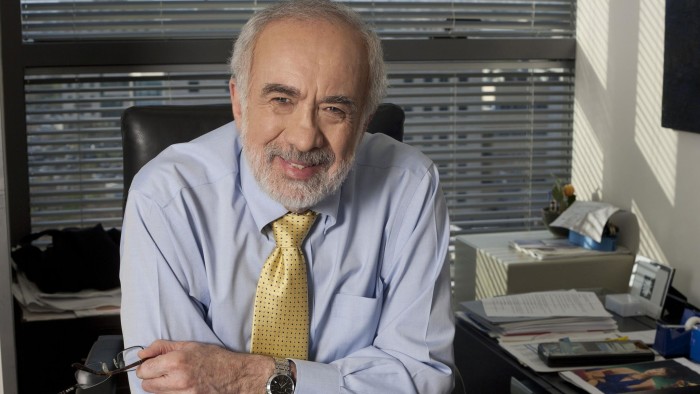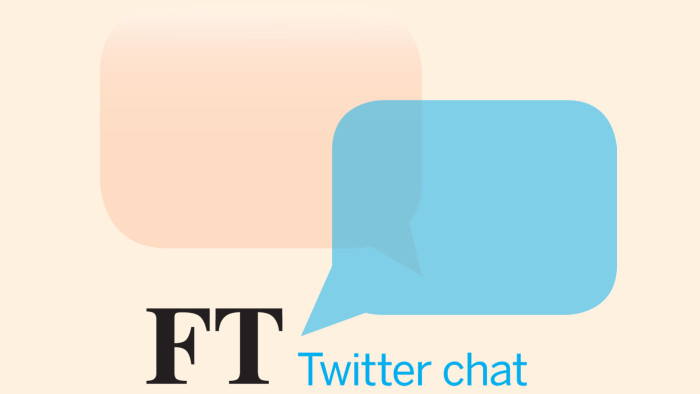Benny Landa: big results come from thinking small

Roula Khalaf, Editor of the FT, selects her favourite stories in this weekly newsletter.
Benny Landa is a serial entrepreneur with grand ambitions and a record of innovating breakthrough technologies and bringing them to market.
The Canadian-Israeli, over the course of a 46-year business career, made headlines several times, most notably when he sold Indigo, a company that pioneered digital printing, to US tech group Hewlett-Packard in 2002. His current corporate vehicle, Landa Group, is harnessing nanotechnology — the manipulation of tiny particles — for a new printing technology that promises to deliver richer, deeper colour at lower cost than current digital printers offer.
Mr Landa’s group also has a laboratory arm whose lofty objective is “saving the planet”. Its technicians have not cracked the holy grail of nanotechnology — converting nanoparticles to electricity — but have had encouraging results in a number of other applications. These range from nanotechnology-empowered hair colouring to automotive paint and “printed electronics” that could obviate the need for bar codes used on packaging.
Carly Fiorina, the US Republican presidential candidate and former Hewlett-Packard chief executive, describes Mr Landa as “an entrepreneur of great passion and vision. Once he decides to tackle something, he unreservedly commits all his considerable energy and intellect.”
In Israel, many technology innovators sell out to foreign shareholders at the first chance, but Mr Landa holds on to his companies for longer, funding them out of his own pocket until they achieve breakthrough status.
Twitter Q&A

How do you get funding? What are the pros and cons of different sources of financing? Put your questions to the experts. Join the FT Twitter chat using #FTentrepreneurs on Friday 5 June at 12.30 in Monaco (11.30 BST)
“I fund everything myself until I run out of money, then I find something else,” he says in an interview in his office in the central Israeli city of Rehovot a few blocks from his company’s factory. “I don’t like to report, to justify. If you look at Thomas Edison or Nikola Tesla, they funded their own work.”
When the 69-year-old businessman puts himself in the same league as the inventors of the lightbulb and modern electrical engineering, the comparison is not entirely fanciful. Mr Landa is sometimes called “the father of commercial digital printing”.
He was born in Poland in 1946, spent his first two years in a refugee camp in Germany, and grew up in Canada. He studied engineering, physics and filmmaking in the UK, and with a friend founded Imtec, a company making microfilm reader printers that went on to become Europe’s largest in its field.
Having grown up in a Zionist household, he moved to Israel in 1974, founding Indigo Digital Printing three years later. Using some of the know-how Mr Landa had developed at Imtec — and the money he earned when the company went public — Indigo went on to invent a process of photocopying that used charged digital particles in liquid ink and applied them to paper at a higher speed than existing copiers.
The company also devised the enabling technology to harness this process for the commercial mass market, including techniques to feed documents at high speeds. Copier companies that had been trying to develop similar technology began to line up for Indigo’s, handing the company $200m of contracts over 10 years.
“This was very lucky for us,” Mr Landa says. “By the time I was running out of money, every copier company in the world needed our patents, so every single one became a licensee.”
Mr Landa and his colleagues thought that the same ink that replaced toner in copiers could also be used in offset printing. In 1983, they set out to develop the world’s first digital printing press.
The effort took more than a decade and, although royalties on his previous patents were still rolling in, by 1993 Mr Landa was running low on cash again. George Soros, the Hungarian-American billionaire, stepped in with a $50m investment in Indigo. A year later, Indigo went public on Nasdaq, trading at a value of $1bn.
The company’s product would go on to transform printing, but before that Indigo went through a rough earnings patch. Its product was ready for market before customers were ready to buy it; some balked at the risk of depending on a supplier in Israel, which was going through a series of bombings at the time. Mr Landa thought bringing in Hewlett-Packard made sense.
When negotiating the deal with the Silicon Valley group, he secured commitments to keep manufacturing, jobs, and supplier relations in Israel, and Indigo remains a big employer and contributor to Israel’s GDP.
“I am here as a Zionist,” he says today. “I didn’t build a start-up to take it out of the country.”
In the decade since the sale of Indigo, his new company has developed “NanoInk”, a process that it says applies the thinnest image of any printing technology around, and at lower cost. Landa Digital Printing launched the technology in 2012 at Drupa, a printing industry trade fair in Germany, and lined up $1bn of orders. Altana, a German speciality chemicals company, has committed €100m to take an undisclosed stake in the company.
Landa’s laboratory arm, meanwhile, is researching a range of nanotechnologies, in many cases in partnership with other companies.
L’Oréal, the French beauty care company, last year bought ColoRight, Landa’s spin-off that developed software that analyses the chemical composition of hair, calculates the precise shade needed to dye it, and then produces the dye. Financial details of the deal were not disclosed, but the Israeli press reported that the sale brought in $150m to $200m.
A high-profile citizen of corporate Israel, Mr Landa helped to lead a boardroom shake-up at Teva, Israel’s largest company at end-2013. That was to prove successful a few months later, when Erez Vigodman took over as chief executive.
Mr Landa and his wife Patsy are philanthropists, and their Landa Fund for Equal Opportunity through Education has distributed more than 200m shekels ($50m) to date, funding scholarships for members of Israel’s Arab minority.
In 2013 he backed Breaking the Impasse, a forum of Israeli and Palestinian businesspeople pressing their leaders to make peace.
Comments